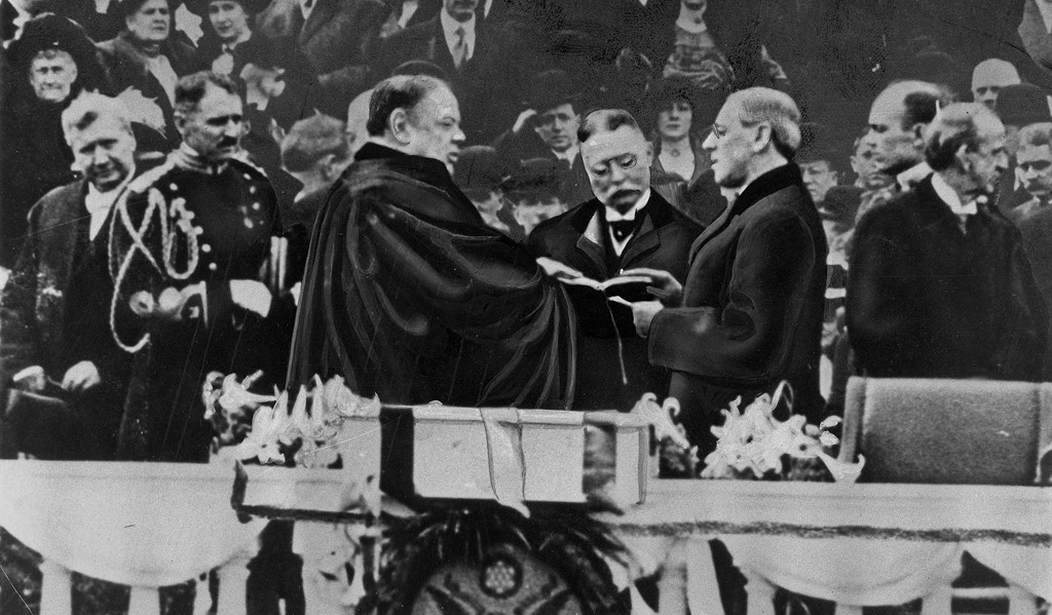The persecution of one’s political opposition is as old as humanity itself. When ancient Rome was still a city-state, one Silvius Tullius was elected king because he proposed policies of reducing the power of the aristocracy in favor of the Comitia Centuriata, an assembly of the common people. The powerful Tarquin family, which had held the kingship on and off for generations, did not agree with the policy. Superbus Tarquinius and his party threw Silvius Tullius down the steps of the people’s Curia and beat him to death on the floor, objecting that his family owned the absolute prerogatives of the kingship.
Such persecution of the political opposition in the modern day began with the rise of Socialism and Fascism in Europe during the Woodrow Wilson administration in the United States: “All power to the Soviets” was the cry on Nov. 6, 1917, of Vladimir Lenin’s Socialist Bolsheviks as they toppled the representative Provisional Government of Russia. “On to Rome” was the cry of Benito Mussolini’s Fascist Black Shirts on Oct. 27, 1922, as that party took power and toppled constitutionally elected Prime Minister Luigi Facta.
Both Lenin’s Bolsheviks and Mussolini’s Fascists followed a common path of outlawing every opposing political party which might threaten “The State.” They also assumed control of the media, the intelligence and police apparatus, the judiciary, and the educational systems.
Both the Socialism of the left and the Fascism of the right had another thing in common. Their common root, or foundation, is in the “Ideal State” philosophy of Frederich Hegel, which assumes that the “State,” whether Socialist or Fascist, is the highest natural societal form, not the individual. Therefore, the “State” can assume the rights of each and every individual, including the right to choose who is elected and makes the laws whereby the people are governed. Therefore, in Hegel’s “Ideal State,” the individual is literally nothing.
Thankfully, in America and Great Britain, our systems of representative government are based on the philosophy of John Locke, which is founded on the recognition of God-given, inalienable, individual rights that no government can assume, and which our common laws were formed to defend. In fact, our highest law, the Constitution of the United States, was conceived, designed, written, and ratified based on the rights of the individual and the protection of such rights against government intrusion into our individual rights and powers. Under John Locke’s constitutional governance, the individual is everything.
The most basic right under a constitutional government is the right to vote in regularly held elections for the persons representing fellow citizens and passing laws whereby the citizens are governed. That is John Locke’s philosophy of constitutional government 101. The citizen’s inalienable right is to choose between the often opposed views of naturally opposed political parties. That is the difference in our system: it defends those we disagree with — no matter who disagrees with whom.
Such has been the success of our constitutional system, based on individual rights, that we in America have held in ridicule some of our American neighbor’s governments as they mimic the styles of governance born in Europe based on Hegel’s philosophy of the Ideal State, whether it has been Castro’s Socialist Cuba mimicking Russia or Augusto Pinochet’s Fascist Chile mimicking Italy, the same root begets the same end — the persecution of political persons and parties, which hold opposing political views to those of the “State.” That persecution has taken the form of mock investigations, mock trials, and fixed elections; followed by real prison terms, real confiscation of property, and real executions. The number and kind of persecutions in Europe and Latin America of the political opposition in the last 100 years are beyond number.
Let’s now go back to the era of Woodrow Wilson. Our 28th president spent his life on Ivy League campuses, being steeped in the “Ideal State” philosophy by his intellectual mentors, Richard Ely and Herbert Adams. Wilson believed what Hegel wrote: “It is the moral Whole, the State, which is that form of reality in which the individual has… freedom. All the worth a human being possesses… he possesses only through the State.” Therefore, only the “State” has rights.
It was based on this common philosophical root that the Democrat, Woodrow Wilson, founded our Administrative State; it was with this philosophical seed that Woodrow Wilson planted Socialism in America.
Tellingly, in Wilson’s political work The State, he demands that there is no such thing as Universal Law that transcends time or place, such as the Ten Commandments or the Constitution of the United States. Wilson believed that laws, any laws, were changeable, based on the will of the “State.” Finally, Wilson held that Russia had it wrong — socialism by revolution was wrong. America would grow socialism the right way — through evolution.
Today, 100 years later, the Democratic Party cheers the Hegelian philosophy of Socialism. The same Socialism is the root cause behind our Administrative State politically persecuting opponents and using the persecutorial tactics that seem so similar to the Europe of the Bolsheviks or the Latin America of Pinochet’s Fascists.
We are at the point when a candidate’s opposed policies motivate the “State” to engage in years of investigations, for the Democratic Party to engage in two impeachment proceedings, and for the indictments that now follow: the tyrannical thorns of Socialism’s policy of persecuting opponents.









Join the conversation as a VIP Member